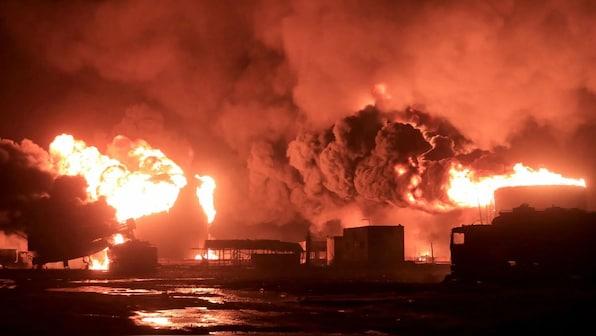
4 big hits in a week: Is Israel going after Houthis in Yemen after demolishing Hamas, Hezbollah?
After silencing Iran, battering Hamas, and forcing Hezbollah into a ceasefire, Israel appears to have the next target in sights: the Houthis in Yemen.
In the past two weeks, Israel and Houthis have exchanged fire at least four times.
Israeli leaders, including Prime Minister Benjamin Netanyahu and his confidant Defence Minister Yoav Gallant, have vowed to impose costs on Houthis for their continued aggression.
Netanyahu has said that Israel would attack Houthis with determination.
“The US, and also other countries, like us, see the Houthis as a threat, not only to world shipping, but also to world order. Just as we acted forcefully against the terrorist arms of Iran’s evil axis, so we will act against the Houthis…with force, determination and sophistication,” said Netanyahu on Wednesday.
Netanyahu vowed to reshape West Asia — and he did
Following the Hamas-led attack on Israel on October 7, 2023, Netanyahu declared war on Hamas.
Shortly after the conflict began, Netanyahu vowed to change the Middle East.
“What Hamas will go through will be tough and terrible, we’re already in the midst of the campaign and we’ve only just begun. I ask that you stand steadfast because we are going to change the Middle East,” said Netanyahu at the time.
More than a year later, the region indeed stands changed.
Hamas, which ran Gaza with an iron fist, has been reduced to an insurgency from a totalitarian regime. Its leaders are dead, ranks are diminished, and much of its infrastructure has been destroyed, including its prized underground tunnels.
In Lebanon, Hezbollah, which joined the war in purported solidarity with the Palestinians, has been battered. Its leadership has been neutralised, its war-waging capacities have been diminished significantly, thousands of its fighters have been killed, and its territorial control has been checked. The group has been reduced to a shadow of its former self after stunning intelligence-led pager and walkie-talkie operations followed by some of the most intensive bombing campaign in decades that was in turn followed by a full-scale ground invasion.
Around the same time, in two rounds of aerial battles with Israel, Iran also became significantly weakened. As Israeli attacks left Iran essentially naked and dealt a setback to its nuclear programme, Iran was in no shape to either help Hamas or Hezbollah as it was busy licking its own wounds. Therefore, Hezbollah decided to go for a ceasefire and Hamas appears to be falling in line as well as reports suggest a deal with Israel is on the horizon.
As Iran was battered and Hezbollah had essentially laid down arms, the opposition groups in Syria seized the opportunity and ousted longtime ruler Bashar al-Assad. With their man out of power in Syria, Iran and Hezbollah lost their strategic depth in the region.
Is Yemen the next battlefield?
The Houthis in Yemen are the last ones standing in Iran’s ‘Axis of Resistance’ against Israel.
There have been reports that Iraq-based, Iran-backed Shia militias have also decided to not pursue the conflict with Israel.
Since December 16, in response to Houthis’ attacks, Israel has conducted five rounds of airstrikes inside Yemen — four of them within a week. On their part, the Houthis have fired more than 200 missiles and 170 drones at Israel in addition to continuing their terrorist campaign in the Red Sea.
In the wake of escalating conflict and Israeli leaders’ statements assuring retribution, it increasingly appears that Yemen could be the next battlefield in West Asia after Gaza and Lebanon.
Defence Minister Katz warned Houthis: “We will strike [the Houthis’] strategic infrastructure and decapitate its leaders. Just as we did to Haniyeh, Sinwar, and Nasrallah, in Tehran, Gaza and Lebanon — we will do in Hodeidah and Sanaa.”
But can Israel really punish Houthis?
Even as Israel has laid bare the intention to punish Houthis, issuing a threat is much easier than implementing it.
For one, Houthis are quite far from Israel, so Israel cannot batter them the way it did Hamas in Gaza Strip next door and Hezbollah in neighbouring Lebanon.
Secondly, even though Houthis are part of the Iran-sponsored ‘Axis of Resistance’ in the region, it does not share exactly the same relationship with Iran that Hamas or Hezbollah had. This means that even though they support each-other, Houthis have independent decision-making. This means that while Iran can pressure Hamas or Hezbollah into making peace with Israel, it cannot do it with Houthis.
Moreover, as Houthis are the only remaining potent force, their assertiveness as well as support from Iran have increased. In short, the group is emboldened more than ever at the moment.
The relationship “will grow closer now that Hezbollah has stood down and Assad has lost power”, said Kenneth Katzman, a Senior fellow at Soufan Center, to The Times of Israel.
However, Wolf-Christian Paes, a Senior Fellow at the International Institute for Strategic Studies (IISS), told ToI that Houthis would not meet Assad’s fate even if Iran’s support ends.
“If tomorrow you had, say, a regime change in Tehran or the government in Tehran would decide to stop this, it doesn’t mean that necessarily the Houthis would stop,” said Paes.
Moreover, Houthis are “well-adapted to withstand bombing campaigns” and are experts in using the mountainous terrain of Yemen to their favour, which makes destroying their launchpads difficult, noted Lazar Berman in an article in ToI.
Berman further said that Israel can only find success against Houthis “by working for a more muscular American and Arab coalition against”. He added that military moves would have to be accompanied by diplomacy, such as “potentially moving toward closer ties with its natural allies in the region”.
Therefore, while Israel can conduct episodic airstrikes inside Yemen to punish Houthis, only a systemic joint-campaign with the United States and other Western militaries may deal a blow major enough to drive the group to scale down their activities.
Source » firstpost.com





